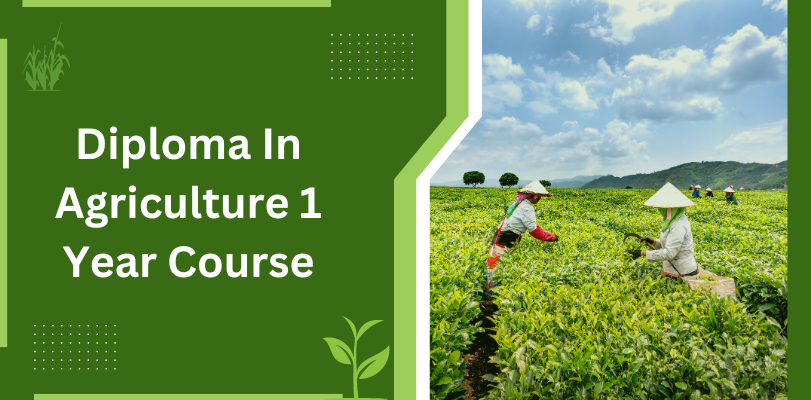
Arrange a Callback
Diploma In Agriculture 1 Year Course
Embarking on a journey in agriculture opens doors to a dynamic field vital for global sustainability. The Diploma in Agriculture, a comprehensive 1-year course, equips students with foundational knowledge and practical skills essential for thriving in this sector. Designed to meet the evolving demands of modern agriculture, this program combines theoretical insights with hands-on training, preparing graduates for diverse roles in farming, agribusiness, and agricultural management. In Haryana, renowned for its agricultural prowess, pursuing a Diploma in Agriculture from a leading college ensures access to top-notch facilities and expert faculty. These institutions, dedicated to fostering excellence in agricultural education, offer specialized courses tailored to the region’s agricultural landscape. Students benefit from immersive learning experiences in crop production, soil science, pest management, and agricultural economics, preparing them for successful careers in the field. Choosing a Diploma in Agriculture College in Haryana not only provides a robust educational foundation but also connects students to a vibrant agricultural community. Graduates emerge ready to contribute meaningfully to Haryana’s agricultural sector, driving innovation and sustainable practices forward.
Why Choose a Diploma in Agriculture?
- Practical Skills: The program provides hands-on training in essential agricultural techniques such as crop cultivation, soil management, and pest control, ensuring graduates are job-ready.
- Industry-Relevant Knowledge: Students gain insights into the latest trends, technologies, and practices shaping modern agriculture, preparing them to tackle real-world challenges.
- Career Opportunities: A Diploma in Agriculture opens doors to diverse career paths in farming, agribusiness, agricultural consultancy, and agricultural management, catering to both rural and urban sectors.
- Contribution to Sustainability: Graduates play a crucial role in sustainable agriculture, promoting environmental stewardship and resource conservation through innovative farming practices.
- Regional Specificity: Programs often integrate regional agricultural practices, making them particularly relevant for students intending to work in specific agricultural regions like Haryana.
Key Benefits of the Course
- Short Duration: The 1-year duration makes it an ideal choice for those who wish to gain specialized knowledge quickly and efficiently.
- Practical Exposure: The course includes hands-on training and field visits, enabling students to apply their learning in real-world scenarios.
- Career Opportunities: Graduates can explore various career paths, such as agricultural officers, farm managers, researchers, and consultants.
- Skill Development: The course focuses on enhancing skills such as problem-solving, critical thinking, and effective communication, which are essential for a successful career in agriculture.
- Support for Rural Development: By promoting efficient farming techniques and sustainable practices, graduates contribute to rural development, agricultural productivity, and livelihood improvement in rural communities.
Course Structure
Core Subjects
- Crop Production: This subject covers the principles and practices of growing various crops, including cereals, pulses, oilseeds, and horticultural crops. Students learn about crop rotation, irrigation methods, and modern farming techniques.
- Soil Science: Understanding soil properties, fertility management, and soil conservation are crucial for sustainable agriculture. This subject delves into soil chemistry, physics, and microbiology.
- Agricultural Economics: This area focuses on the economic principles governing agricultural production, marketing, and distribution. Students learn about farm management, agribusiness, and the role of government policies in agriculture.
- Pest Management: The course offers insights into integrated pest management (IPM) strategies, plant protection measures, and the safe use of pesticides.
Elective Subjects
- Animal Husbandry: Fundamentals of livestock management, dairy farming, and poultry production.
- Agri-Business Management: Concepts of agricultural marketing, supply chain management, and entrepreneurship.
- Horticulture: Techniques for cultivating fruits, vegetables, and ornamental plants.
Admission Requirements
- Educational Qualifications: Applicants must have completed their secondary education (10+2) from a recognized board or equivalent educational institution.
- Minimum Percentage: Some institutions may specify a minimum percentage requirement in the qualifying examination, typically around 50% or as per the institution’s guidelines.
- Entrance Exams: Certain colleges may require candidates to pass a relevant entrance examination. The syllabus for these exams usually covers subjects like Biology, Chemistry, Physics, and Mathematics.
- Entrance Exams: Certain colleges may require candidates to pass a relevant entrance examination. The syllabus for these exams usually covers subjects like Biology, Chemistry, Physics, and Mathematics.
- Documents: Applicants need to submit essential documents such as mark sheets/certificates of the qualifying examination, proof of age (birth certificate or school leaving certificate), and any other documents specified by the institution.
Career Prospects
A Diploma in Agriculture opens up a plethora of career opportunities. Graduates can find employment in various sectors, including:
- Farm Management: Managing agricultural operations on farms, including crop production, livestock management, and farm machinery maintenance.
- Agribusiness Management: Working in agricultural businesses involved in processing, marketing, distribution, and retail of agricultural products.
- Agricultural Extension Services: Providing advisory and support services to farmers on modern farming techniques, crop management, and sustainable agriculture practices.
- Agricultural Research: Conducting research in agricultural sciences, developing new crop varieties, improving farming techniques, and addressing agricultural challenges.
- Government Agricultural Departments: Working in government agencies involved in agriculture, rural development, and agricultural policy-making.
- Experienced Faculty : These institutions pride themselves on their faculty, who bring a wealth of expertise and experience in the classroom. Students benefit from the guidance of professors who have a deep understanding of the subject matter and a promise to student success.
- State-of-the-Art Facilities : Haryana’s MCA colleges are equipped with modern facilities, including advanced high-speed internet, computer labs, and extensive libraries.These resources create an ideal learning environment for students to Innovate and thrive.
- Industry Connections : MCA College in Haryana maintains strong connections with the tech industry, placements, facilitating internships, and industry projects. This ensures that students gain practical experience and access job opportunities upon graduation.
Conclusion
In conclusion, the Diploma in Agriculture offers a comprehensive pathway for individuals passionate about agriculture to acquire essential skills and knowledge. This intensive 1-year course not only provides practical training in crop management, soil science, and agricultural economics but also prepares graduates for diverse career opportunities in farming, agribusiness, research, and beyond. With a focus on sustainability and modern agricultural practices, the diploma equips students to tackle real-world challenges and contribute meaningfully to the agricultural sector. Whether aspiring to manage farms, innovate agricultural technologies, or promote rural development, graduates of this program emerge ready to make a positive impact in Haryana’s agricultural landscape and beyond. Choosing a Diploma in Agriculture is not just a step towards a fulfilling career but also a commitment to fostering sustainable agriculture and ensuring food security for future generations.


